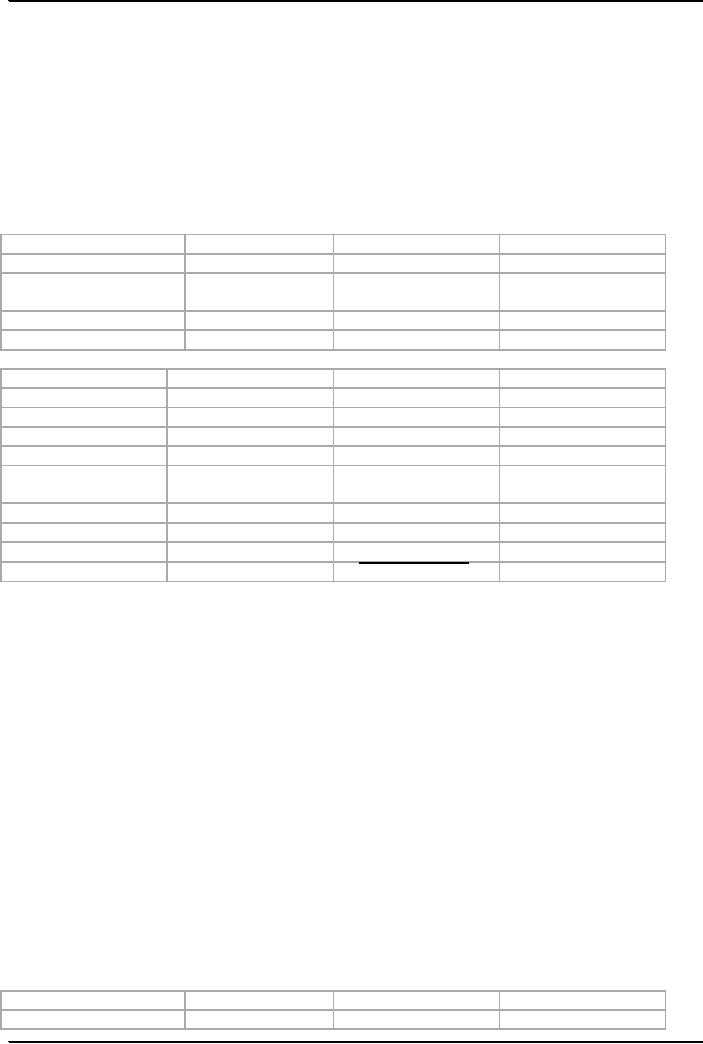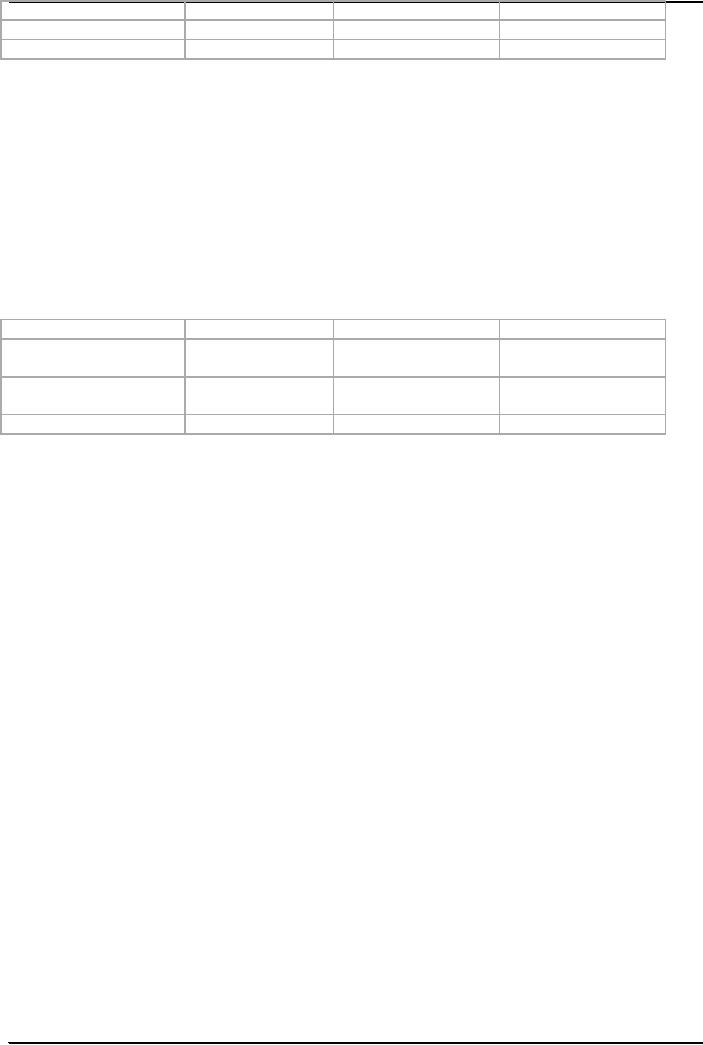 |
PROVIDENT FUND |
| << Gratuity Exercise |
| Exemptions on Business income, Treatment of Speculation Business >> |

Taxation
Management FIN 623
VU
MODULE
6
LESSON
6.31
SALARY
AND ITS COMPUTATION
PROVIDENT
FUND
Types:
� Statutory
Provident Fund, governed by the Provident
Funds Act, 1925 (GP
Fund)
� Recognized
Provident Fund (recognized by
Commissioner of Income Tax under
Part I of Sixth
Schedule).
� Unrecognized
Provident Fund
Recognized
Provident Fund defined in
clause (48) of Section 2 as
under:
Means
a provident fund recognized by the
commissioner in accordance with
Part I of Sixth
Schedule.
Recognized
Provident Fund under Part I of 6th
Schedule
CIT
may accord recognition, if
fund in compliance with
requirements as laid down in rule
2.
CIT
may withdraw recognition after
providing reasonable opportunity to the
trustees of the fund of
being
heard.
Condition
for Approval
� All
employees shall be employed in
Pakistan or
� Shall
be employed by employer whose principal
place of business is in
Pakistan.
� Contributions
by employee in a tax year shall be a
definite proportion of his
salary.
� Contributions
by employer to the Individual account of an
employee in a tax year shall
not exceed the
contributions
made by the employee.
� Fund
shall be vested in two or
more trustees, or official
trustee.
� The
accumulated balance due to an
employee shall be payable on the
day, he ceases to be an
employee
of the
employer, who is maintaining the
Fund.
Tax
Treatment:
The
following is the tax treatment of different kinds of
provident funds:
� Statutory
Provident Fund [Wholly exempt]
Clause 22.
� Recognized
Provident Fund [Partially taxable
within limits].This is defined in
section 2(48) as a
provident
fund which has been
recognized by the Commissioner of Income
Tax in accordance
with
the
rules contained in Part I of the Sixth
Schedule. Employer's contribution up to 10
per cent of
salary
is exempt. Employer's contribution
exceeding 10% of `salary' is taxable
under rule 3, Part 1
of
Sixth Schedule.
Recognized
Provident Fund
The
accumulated balance due and
becoming payable to any
employee participating in a
recognized
provident
fund is fully
exempt under
clause
(23) Part I
of Second Schedule.
Provident
Fund
Un-recognized
provident fund [wholly
taxable]
Exercise
on Provident Fund
Mr. A
received credit of Rs. 50,000 as
employer's contribution to recognized
provident fund, his
salary
during
tax year 2007 is given below:
1.
Basic salary
Rs.840,000
2. Computer
allowance
Rs.
12,000
3.
Medical allowance
Rs.
60,000
Compute
taxable income and tax thereon
for tax year 2007.
Solution:
Tax
payer: Mr. A
Tax
year: 2007
Residential
Status: Resident
NTN:
000111
Computation
of taxable income and tax
thereon:
In
Rs.
Particulars
Total
income
Exempt
Income
Taxable
Income
Basic
Salary
840,000
Nil
840,000
Computer
allowance
12,000
Nil
12,000
54

Taxation
Management FIN 623
VU
Medical
allowance
60,000
84,000
Nil
(10% of
basic exempt)
Employer's
contribution
---
---
---
to SPF
Exempt (Note-1)
Taxable
Income
852,000
N-1:
Under
rule 3 of Part I of Sixth Schedule
exemption is available up to 10% of
salary and excess
amount
shall
be taxable. In this case entire amount
i.e.; Rs. 50,000 is exempt
as it is within prescribed limit
of
10% of
salary.
N-2:
Taxable
income shall be Rs 852,000
and tax can be computed as explained in previous
exercise.
Benevolent
Grant
Exercise
on Benevolent Grant:
Mr. A,
a govt. servant retired on 01-05-2007. He
received Rs. 600,000 from
duly approved benevolent fund.
He
received total income amounting
Rs. 480,000 under the head
salary during tax year
2007.
Compute
taxable income and tax thereon in
respect of Mr. A for tax
year 2007.
Exemption
on account of benevolent grant paid from the
Benevolent Fund under clause (24) of
part 1
of 2nd schedule.
(24)
any benevolent grant paid from the Benevolent
Fund to the employees or members of
their
families
in accordance with the provisions of the Central
Employee Benevolent Fund and
Group
Insurance
Act, 1969.
MODULE
7.31
INCOME
FROM PROPERTY
Taxation
of rental income arising from
use and exploitation of immovable
property `Income
from
Property'
includes
Rent received or receivable by a
person in a tax year other
than rent exempt from
tax.
Sec 15
(1)
Rent
means
any income received or
receivable by the owner of land or building as
consideration for:
Use of
land or building
Occupation of land
or building
Right
to use the land or building
Rent
also includes forfeited
deposits paid under a contract for the
sale of land or building.
Where
a building leased out together
with Plant & Machinery, it is not
income from property' but
`income
from
other sources' Sec.
15(3).
Rent
to be in line with Fair Market
Rent. Where the rent
received or receivable by a person is
less than the
fair
market rent for the
property; the person shall be
treated as having derived the fair market
rent for the
period,
the property is let on rent in the tax
year.
Where
utilities provided by any
person are included in rent, such amount
shall be chargeable to tax under
the
head income from other
sources and not under the
head income from
property.
Exemptions
available under property
income:
Any
income of a trust or welfare institution
from housing property clause
(58)(1) as provided in sub
clause
(2)
and (3) of clause (58).
The said clauses are
reproduced below:
(2)
A
trust administered under a scheme approved by the
Federal Government in this behalf
and
established
in Pakistan exclusively for the
purposes of carrying out
such activities as are for the
benefit
and
welfare of-
i.
Ex-servicemen
and serving personnel,
including civilian employees of the
Armed Forces, and
their
dependents;
or
ii.
Ex-
employees and serving
personnel of the Federal Government or a
Provincial Government
and
their
dependents, where the said trust is
administered by a committee nominated by the
Federal
Government
or , as the case may be, a
Provincial Government.
(3)
A
trust or welfare institution [or
non- profit organization] approved by
[Regional Commissioner of
Income
Tax] for the purposes of this
sub-clause.
55

Taxation
Management FIN 623
VU
Exemptions
available under Clause (59)
of part 1 of 2
nd
schedule on
income from property
held
under
trust or other legal obligations
for religious or charitable
purpose.
Certain
deductions were allowable/
permissible under sec 17 up to tax year
2006. Section 17 stands
omitted
by
Finance Act, 2006. Hence no
deductions are permissible
from 1st
July
2006.
Sec 15
(7) the provisions of sub section
(1) Section 15 shall not
apply in respect of a Tax Payer
who:
i.
is an
individual or association of
persons;
ii.
Derives
income chargeable to tax under this
section not exceeding Rs.
150,000 in a tax year;
and
iii.
Does
not derive taxable income under
any other head.
However,
Fair Market Rent not
applicable when lessee
chargeable to tax under the head `Salary
Income'.
The
rent received shall not be
chargeable to tax in respect of a tax
payer who
Is an
individual or association of
persons;
Derives
income chargeable to tax under this
section not exceeding Rs.
150,000/- in a tax year;
and
Does
not derive taxable income under
any other head.
Treatment of
Non-Adjustable Amounts Received in
Relation to Buildings
These
amounts shall be treated as
rent and chargeable to tax under the
head "income from property".
These
amounts
are spread over a period of
10 years, It is adjustable as
Rent.
ILLUSTRATION
Say
non-adjustable advance rent received
Rs.120,000.
Amount
adjustable shall be 120,000/10 =
Rs.12,000 Rs12,000 shall be
adjustable for ten
years.
Admissible
Deductions before tax year
2007
� Allowance
for Repair-----1/5 of total
Rent in a tax year. It is a statutory
allowance.
� Insurance
Expenses (Payment of
Premium)
� Taxes,
charges, property tax
� Ground
rent paid or payable by the
person.
� Interest
(Mark-up, Profit) paid on money
borrowed for the
property.
� Rent
sharing by House Building Finance
Corporation.
� Rent
collection charges, actually incurred---
(not to exceed 6% of total
rent receivable for the tax
year.
� Legal
expenses in connection with the relevant
property.
� Unpaid
rent (irrecoverable rent).
� Any
expenditure allowed to a person under this head as
deduction, shall not be allowed as
expense
under
any other `Head of
income'.
Treatment of
Income from Property under
Sec 155:
(1)
[Every] prescribed person making a
payment in full or part
(including a payment by way
of
advance)
to any person on account of
rent of immovable property) including
rent of furniture and
fixtures,
and amounts for services
relating to such property) shall
deduct tax from the gross amount
of
rent
paid at the rate specified in the First
Schedule (5% of gross rent
paid).
(2)
The tax deducted under sub-section
(1) shall be a final tax on the
income from property.
(3)
In this section, "prescribed person"
means--
i.
The
Federal Government;
ii.
A
Provincial Government;
iii.
Local
authority;
iv.
A
company;
v.
A
non-profit organization;
vi.
A
diplomatic mission of a foreign
state; or
vii.
Any
other person notified by the
CBR for the purpose of this
section.
The
Rate of Tax on Property
Income under section 15, 5% of the
gross amount of rent is chargeable to
tax.
Exercise-1
Compute
taxable income of Mr. A, an
individual in the light of following
data/ information, relevant to tax
year
2006.
� Mr.
A let out a building to M/S XYZ
and received rent amounting Rs
1,600,000 during the tax
year.
� M/S XYZ
also paid amount of Rs 800,000 as non-adjustable
advance.
� Mr.
A spent Rs 60,000 on account of
repairs of said
building.
� Insurance
premium paid by Mr. A Rs 40,000
� Property tax
in lieu of said property paid Rs
50,000
56

Taxation
Management FIN 623
VU
� Property tax
paid in lieu of house owned and
occupied by Mr. A Rs
20,000
� Salary
paid to employees hired for the
purpose of rent collection Rs
120,000
� Fee
paid to a law firm Rs
50,000
� Mr.
A entered into a sale
agreement with Mr. Y on
account of sale of a building at a
price of Rs 2
million
and received Rs 200,000 as an
advance. Mr. Y failed to
make the balance payment,
hence
advance
forfeited.
� Mr.
A had constructed the said
property after availing loan from a
commercial bank and paid mark-up
amounting Rs
40,000 during the tax
year.
Solution
of Exercise 1
Tax
payer: Mr. A
Tax
year: 2006
Residential
Status: Resident
NTN:
000111
Computation
of taxable income and tax
thereon:
In
Rs.
Particulars
Total
income
Exempt
Income
Taxable
Income
Rental
Income
1,600,000
Nil
1,600,000
Non
adjustable advance
80,000
Nil
80,000
N-1
Forfeited
deposit
200,000
Nil
200,000
Gross
Total
1,880,000
Particulars
Total
income
Deductions
Taxable
Income
Gross
income B/F
1,880,000
----
----
Repairs
N2
----
136,000
----
Insurance
Premium
----
40,000
----
Property
tax
----
50,000
----
Property tax of
self-
----
----
----
occupied
House N-3
Rent
Collection N-4
----
112,800
----
Legal
charges
----
50,000
----
Mark-up
paid
----
40,000
----
Total
668,800
1,211,200
Taxable
income is:
Rs.
1,211,200
Tax
thereon:
Rs.
1,211,200 x 5%= 60560
N-1:
Non
adjustable advance is spread
over ten years.
N-2:
Repairs
allowed as statutory allowance@ 1/5th of
gross rental.
N-3:
Expenditures
allowed in respect of building that is
generating rental income.
N-4:
Rent
Collection charges not to
exceed 6% of gross rental
income.
N-5:
Forfeited
amount on account of cancellation of sale
agreement of building shall be
treated as rental income.
Exercise
2:
Compute
taxable income and tax thereon in
respect of Mr. A for tax
year 2007. Relevant
information / data
is given
here under:
Rental
income from shop Rs
120,000
Mr. A
is an employee of a federal government
and received gratuity, Rs.900,000 on
retirement.
Solution
of Exercise 2
Tax
payer: Mr. A
Tax
year: 2007
Residential
Status: Resident
NTN:
000111
Computation
of taxable income and tax
thereon:
In
Rs.
Particulars
Total
income
Exempt
Income
Taxable
Income
Rental
Income
120,000
120,000
Nil
57

Taxation
Management FIN 623
VU
Note-1
Gratuity
900,000
900,000
Nil
Taxable
Income
Nil
N-1:
Rent
received under the head income
from property shall be
exempt, if following condition
are met;
Person
receiving rent under this head is an
individual or AOP.
Income
under this head for a tax year
does not exceed Rs
150,000
The
person does not derive
taxable income from any
other head of income.
Exercise
3:
Compute
taxable income and tax thereon in
respect of Mr. A for tax
year 2007 from the
following
information
/ data.
Rental
income from building
Rs
450,000
Non-
adjustable advance
received
Rs
200,000
Solution
of Exercise 3
Tax
payer: Mr. A
Tax
year: 2007
Residential
Status: Resident
NTN:
000111
Computation
of taxable income and tax
thereon:
In
Rs.
Particulars
Total
income
Exempt
Income
Taxable
Income
Rental
Income
450,000
Nil
450,000
Note-1
Non
adjustable advance
---
---
20,000
(Note-1)
Taxable
Income
470,000
Under
the head "Income from
Property" tax is payable at the rate of
5% of gross amount of rent
received.
Hence
tax payable = 470,000 x 5% = Rs
23,500
N-1:
Non
adjustable amount received by the owner of the
building from the tenant shall be
treated as rent
chargeable
to tax under the head "Income from
Property" in the tax year in which it
was received and
following
9 tax years in equal proportion.
Sec16.
58
Table of Contents:
- AN OVERVIEW OF TAXATION
- What is Fiscal Policy, Canons of Taxation
- Type of Taxes, Taxation Management
- BASIC FEATURES OF INCOME TAX
- STATUTORY DEFINITIONS
- IMPORTANT DEFINITIONS
- DETERMINATION OF LEGAL STATUS OF A PERSON
- HEADS OF INCOME
- Rules to Prevent Double Derivation of Income and Double Deductions
- Agricultural Income
- Computation of Income, partly Agricultural,
- Foreign Government Officials
- Exemptions and Tax Concessions
- RESIDENTIAL STATUS & TAXATION 1
- RESIDENTIAL STATUS & TAXATION 2
- Important Points Regarding Income
- Geographical Source of Income
- Taxation of Foreign-Source Income of Residents
- Exercises on Determination of Income 1
- Exercises on Determination of Income 2
- SALARY AND ITS COMPUTATION
- Definition of Salary
- Significant points regarding Salary
- Tax credits on Charitable Donations
- Investment in Shares
- SALARY AND ITS COMPUTATION EXERCISES 1
- SALARY AND ITS COMPUTATION EXERCISES 2
- SALARY AND ITS COMPUTATION EXERCISES 3
- Tax treatment of Gratuity
- Gratuity Exercise
- PROVIDENT FUND
- Exemptions on Business income, Treatment of Speculation Business
- Deductions Allowed & Not Allowed
- Deductions: Special Provisions, Depreciation
- Methods of Accounting
- Taxation of Resident Company
- Taxation of Companies: Exercises
- Computation of Capital Gain
- Disposals Not Chargeable To Tax
- TAX RETURNS & ASSESSMENT OF INCOME UNIVERSAL SELF ASSESSMENT SCHEME
- Normal Assessment, USAS, Provisional Assessment, Best Judgment Assessment
- ADVANCE TAX COLLECTION & RECOVERY OF TAX PENALTIES & PROSECUTION
- What is Value Added Tax (VAT)?
- SALES TAX
- SALES TAX RETURNS